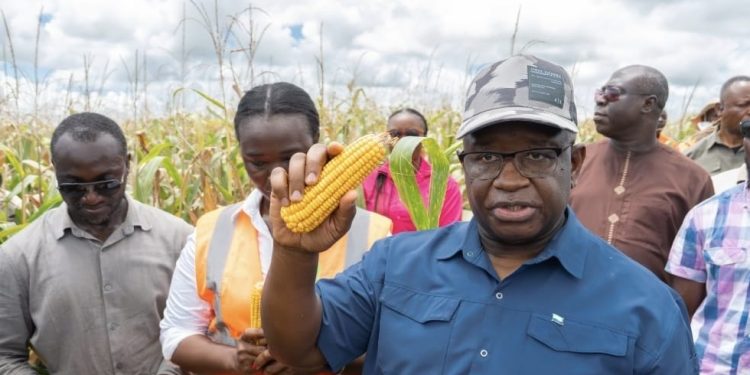By Albert David
Since President Julius Maada Bio assumed office, his administration has received hundreds of millions of dollars and euros in loans and grants earmarked for agricultural revitalization and poverty alleviation. Yet, Sierra Leone remains alarmingly dependent on imported staples, rice, poultry, milk, and basic food items, while local production stagnates and citizens endure skyrocketing food prices, unemployment, and inflation.
The flagship “Feed Salone” program, launched with fanfare and a budget of over 1.6 billion Leones, promised food sovereignty and economic transformation. Instead, it has delivered photo ops of officials clutching corn and peppers, while over 90% of the population still cannot rely on locally produced food. This is not agricultural progress, it is political theater.
Despite the establishment of agro-processing zones and seed roadmaps, the outcomes remain disturbingly shallow. The average rice yield hovers at 2.09 tons per hectare, far below regional benchmarks, and access to quality seeds remains under 10%. These figures expose a glaring disconnect between the funds received and the results delivered.
The Feed Salone initiative, now two years old, has become a symbol of manipulation and constitutional betrayal. Millions have been solicited in the name of the suffering majority, yet the process, from fund acquisition to utilization, lacks transparency, accountability, and genuine empathy for the suffering majority in the country. The government’s rhetoric is rich, but the soil remains poor.
This is not merely an economic failure, it is a moral and democratic collapse. The misuse of international aid and public funds under the guise of agricultural reform reflects a deep erosion of leadership integrity. The suffering of Sierra Leoneans has been politicized, monetized, and weaponized for self-serving agendas.
The constitutional promise to protect and uplift the people has been violated. Instead of empowering farmers, the administration has empowered itself with deceptive narratives and staged celebrations. The Feed Salone campaign, once a beacon of hope, now stands as a devastating indictment of governance gone astray.
Sierra Leone should have been the breadbasket of West Africa. Instead, it is a cautionary tale of how political rhetoric can mask economic decay. The time has come for radical journalistic inquiry, civic mobilization, and international scrutiny. The people deserve answers, not corn in a minister’s or a President’s hand, but food on their tables.











